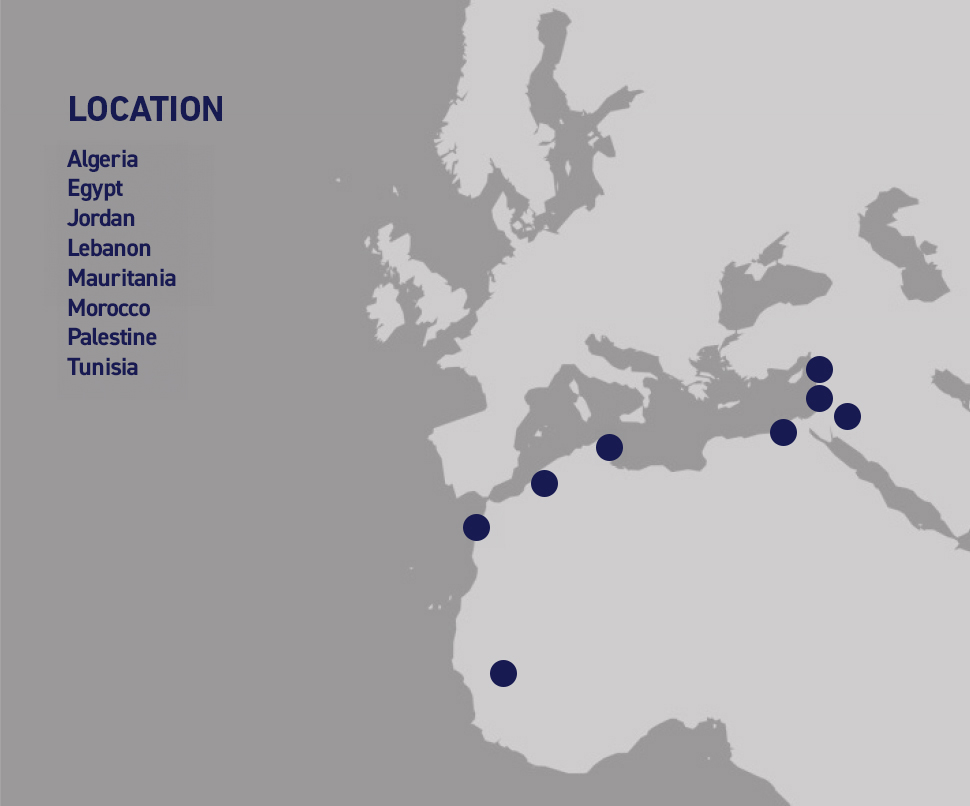
Get into Green
Context and objectives
The Middle East and North Africa (MENA) region is one of the most climate-sensitive areas in the world. These countries experience exacerbated impacts of climate change, which weaken the sustainability and resilience of their ecosystems, societies, and economies, on which many local populations depend. The World Bank estimates the economic costs of environmental deterioration at 2.1% of the gross domestic product in Tunisia and the cost of air pollution at 5% of the annual GNP in Egypt. In other words, climate change and its consequences can exacerbate social disparities, marginalisation, and inequalities amongst vulnerable groups.
To address these challenges, many countries in the region are veering towards green economies by formulating policies for sustainable development, including renewable energies, sustainable transport, sustainable agriculture, waste management, water management. Such a transition will entail profound changes to the region’s economies and societies. However, it is necessary to include an inclusive approach to avoid leaving any social groups behind.
In this regard, the project Get into Green focuses on accelerating the digital, technologic, and green transformation of the Southern Mediterranean economies by supporting inclusive job training and entrepreneurship. This project aims to highlight the leverage that the digital economy and technology represent in accompanying the transitions of North African economies. Indeed, to avoid the development of an already existing digital divide, Get into Green emphasizes the inclusion of the most vulnerable populations from rural areas or low-income backgrounds so that they can familiarize themselves with and professionalize through these new skills.
Another main pillar of Get into Green is to counteract the underrepresentation, gender pay gap and undervaluation of women within the labour market. In the MENA region, only 19.77% of women participate in the labour force, the lowest rate globally. Additionally, the unemployment rate for young women in MENA stands at 42%. To this end, the project will support women of Morocco, Tunisia, and Egypt in getting technical, soft, and digital skills in sustainable agriculture and technology, circular economy, and green industrial design.
Location

Key figures
Duration:
12 months
Countries:
8
Budget for the action
366,858.06 EUR
Grant awarded:
293,486.45 EUR
Promoter
INCO is a nonprofit organisation fighting economic inequality and climate change in over 50 countries around the world. Since 2010, INCO’s mission has been to create economic opportunities for all by providing skill programs to job seekers facing barriers to employment. The organisation’s courses lead to careers in tech, sustainability, and more. Established in Tunisia and Morocco in 2016 and 2018, INCO has been carrying out numerous programs and projects to support social & green entrepreneurship and access to employment in the tech sector.
INCO and the Fondation Orange Tunisie are partnering within the framework of this project to leverage their respective expertise and their shared presence in North Africa to promote the development of green and digital skills for the benefit of youth, particularly young women.
Key partners
Fondation Orange Tunisie – Fondation d’Entreprise Orange
Beneficiaries
- Young unemployed women (age 18 to 30) from Beja in Tunisia, Rabat in Morocco, and Cairo in Egypt (100 women selected for the program).
- Young individuals from the 8 targeted countries (300 men and women between 18 and 30 years old) currently undergoing training in digital jobs who wish to acquire complementary skills to distinguish themselves in the job market.
- FabLab Managers from the three Solidarity FabLabs of the Orange Foundation, enabling them to develop and implement training programs in green professions.
Key actions
Implementation of a capacity building program dedicated to three Solidarity FabLabs, one in each targeted country. The training courses will be created around three sectors identified by the FabLabs teams: Circular Economy in Morocco, Green Industrial Design in Egypt, and sustainable agriculture and technology in Tunisia.
Identification & selection of learners by each Solidarity FabLab: Each Solidarity FabLab, in coordination with INCO, will simultaneously launch calls for applications to identify and select around thirty learners in each country. Each call for application will be related to the targeted sector.
Implementation of 3 Get Into Green Bootcamps: Following the capacity building program, the green training programs that have been co-designed will be implemented.
Post-Bootcamp follow-up of Learners over a period of three months.
Identifying IT training centres in the 8 target countries to provide them with online trainings on digital green skills.
Implementation of the green digital skills training program: dedicated to 300 young men and women who already have a digital academic background.
Implementation of the green digital skills Alumni program.
Expected results
Improved range of green economy-related training and capacity building programs in the UfM region
300 job seekers (at least 50% women) upskilled with green digital skills through an online training program.
Increased resources for women to start green enterprises and to work in ecologically relevant sectors through more information and skilling opportunities.
Young men and women with a digital academic background have access to new opportunities in the digital and green economy.
